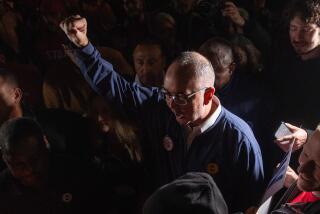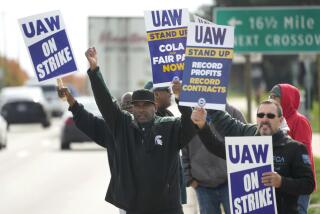Superior Remains the Big Wheel : Manufacturing: The Van Nuys-based maker of aluminum wheels continues to thrive even though its biggest customer makes fewer cars.
- Share via
The General Motors plant in Van Nuys will close this month, but Superior Industries, its nearby supplier of aluminum wheels, isn’t fretting. In fact, Superior will get even more work when GM shifts production of Camaros and Firebirds, long made in Van Nuys, to its new home in Canada.
So it has been for Superior Industries International Inc. of Van Nuys, which continues to spin out more wheels even while its biggest customer produces fewer cars at fewer plants.
Indeed, despite the U. S. auto industry’s slump, Superior has grown steadily as demand for the sleeker, pricier wheels has boomed. With the help of non-union labor at new plants built in low-wage states, Superior boosted its sales from $169 million in 1987 to $273 million last year.
Superior is the country’s biggest maker of aluminum wheels and can produce them more cheaply than the big car makers, which is a major reason GM and Ford account for 90% of Superior’s sales.
Superior’s earnings have been equally impressive, doubling in five years to $18.2 million in 1991. And its stock, despite being erratic at times, has climbed from $4.50 a share in late 1987 to $26 on Monday’s close.
“They’ve consistently surprised . . . with their earnings,” said Joseph Phillipi, an analyst with Lehman Bros., who expects Superior’s earnings to jump 40% this year.
*
Superior’s success, however, hasn’t come without a struggle. Fiercely anti-union, Superior’s founder and longtime chairman, Louis L. Borick, bitterly fought off attempts by the United Auto Workers to represent workers at the Van Nuys plant. After an eight-year battle, Borick finally got rid of the union threat in March, when Van Nuys workers voted to oust the UAW.
But in the process, Superior’s image was marred by allegations from the UAW that it was running a sweat shop of underpaid, mostly Latino workers. And state safety inspectors have case files several inches thick on Superior--although the company has been getting better marks in recent years from them.
Superior also continues to be tested by its two main customers, GM and Ford. GM in particular is increasing pressure on suppliers to cut prices, and that could slow Superior’s growth.
“Every contract is being examined,” said Wendy Caplan, an analyst with the New York investment firm Wertheim Schroeder. “So there is some risk” for Superior, she said. GM officials would only say that Superior is one of their highest-quality suppliers.
For its part, Superior is trying to broaden its customer base. Through a joint venture with Topy of Japan, Superior recently got contracts with five Japanese auto makers. And this summer, it received an $11-million annual contract to supply wheels for 1994 model cars made at the Flat Rock, Mich., plant operated jointly by Ford and Mazda.
The reasons for Superior’s growth are numerous, and it has been fueled by rising demand. Consumers favor aluminum wheels because they “provide high-tech styling,” said Dennis Connor, a Ford procurement manager.
A decade ago only 4% of the cars sold in the United States had aluminum wheels, according to Ward’s Automotive Reports, but this year it’s 33%. The figure is slightly higher for light trucks. Philip Fricke, a Prudential analyst, thinks that the demand will climb to at least 40% for cars and trucks. And based on that, he estimated that Superior’s shipments will rise from 6.4 million wheels this year--about 38% of the expected 16.5 million total of U. S. shipments--to 8.7 million in 1995.
*
Car dealers like aluminum wheels because they boost profits. Superior charges an average $45 to $50 per wheel to GM and Ford. But a silver aluminum wheel for GM’s ’92 Firebird retails for $410--four times the price of a comparable steel wheel. Auto makers have another reason for liking them: Aluminum wheels weigh a third less than steel, which helps car companies meet the government’s higher fuel-efficiency standards.
The increased demand, of course, has also boosted profits of the other half a dozen major suppliers of aluminum wheels. That includes No. 2 Kelsey-Hayes, a Canadian-based conglomerate.
But Superior, more than any of its competitors, has made the most of the opportunity, analysts say. Superior got its first contract with GM and Ford in the mid-1970s. When demand started taking off a decade ago, it used its foothold and technological know-how to get additional contracts.
Superior also raced ahead of its rivals by quickly adding capacity. In the last six years, it built four non-union wheel plants--two in Arkansas and one each in Kansas and Tennessee. That raised Superior’s annual capacity from 2 million wheels to 8.5 million. By being the largest producer, analysts say, Superior has economies of scale that are unmatched by its rivals.
Its new $40-million plant, in Johnson City, Tenn., opened in March and will supply wheels for the new Camaros and Firebirds. Superior financed the construction entirely with internal funds and built it in less than 10 months.
The speed with which Superior has been able to move, analysts and company officials say, reflects the entrepreneurial style of the company’s 68-year-old founder, Borick, who started the company more than 40 years ago with $3,000, mostly borrowed from his sister. He began by selling plastic car-seat covers.
Known as a gruff and hands-on leader, Borick declined to be interviewed. But Ray Brown, 64, Superior’s senior vice president and No. 2 officer, said there are few meetings, memos or other formalities of a big company. Dressed in a half-sleeve sports shirt, golf slacks and white shoes, Brown said, “We have total communication.”
Borick’s style, however, has brought him into clashes with the UAW. In 1984, workers at Superior’s plant in Van Nuys voted to be represented by the union. Borick contested those results, and for the next six years the matter was entangled in legal proceedings. In 1990 the National Labor Relations Board ordered Superior to bargain with the UAW, but before a contract could be reached, Superior’s Van Nuys workers in March voted the union out, by 362 to 163.
In its aftermath, UAW officials accused Superior of using unfair tactics to win over workers while stalling during contract negotiations. The union also blamed its loss on high worker turnover.
Baltazar Martinez, a UAW representative, said working conditions at the Van Nuys plant are still poor, although he acknowledged that things have improved from the early 1980s when “workers used to joke about wearing out their shoes in two months because of the heat and aluminum shavings on the floor.”
At the state’s Division of Occupational Safety and Health in Van Nuys, records show that inspectors last visited Superior’s Van Nuys plant in November, 1990, a few days after a worker broke his foot and ankle when he was pinned between a pallet and forklift. During the inspection, officials gave Superior an “average” grade for safety and health programs, but in an evaluation of the employer’s good faith, Superior received a below average, or “fair,” grade. Safety officials, however, did not issue any fines against Superior, and they closed the case in June.
Jeff Ornstein, Superior’s vice president of finance, refused to talk about the union’s accusations. But he said the workers’ vote in March to oust the union spoke for itself.
“Our wages and our conditions,” he said, “are obviously competitive and acceptable to our very happy work force.”
Ornstein, 50, also declined to discuss wage rates of employees. But payroll records that the UAW said it got from Superior during negotiations showed that in September, 1990, production workers at Superior’s Van Nuys plant made from minimum wage to $10 or more an hour. But most of them earned between $5 and $8 an hour, records showed. By contrast, production workers at GM’s Van Nuys auto assembly plant made about $16 an hour at that time.
*
That wage discrepancy, of course, is a big reason why GM, Ford and other auto makers look for outside producers of aluminum wheels. Analysts note that it’s no surprise that Superior’s new plants were built in Kansas, Arkansas and Tennessee--all of them right-to-work states where wages are below the national average. Superior officials said they built plants there because they were closer to the car makers.
Last year, Borick received $1.2 million in salary and bonus, company documents show. Borick and his wife, Juanita, hold 9% of the company’s stock, which is worth about $40 million.
With the apparent end of its union fight at Van Nuys--UAW officials concede that they have no plans to organize there again--analysts say Superior has conquered what had been seen as a major threat to its competitiveness.
Superior, however, faces one other potential problem: When the day comes, who will succeed its longtime leader Borick?
“That’s a big question mark,” said Leo Ladehoff, chairman of Amcast, a Dayton, Ohio, firm that makes aluminum wheels. “I don’t see a ready replacement for Mr. Borick.”
Superior’s Ornstein disagreed, saying: “We don’t have a formal plan, but there’s competent management in each area.” Of Borick, he added, “He’ll be with us for a long time.”
Superior Industries International, Inc. at a Glance Superior Industries International is an aluminum car wheel maker based in Van Nuys.Founded more than 40 years ago by its chairman and chief executive, Louis L. Borick, the company has flourished in the last decade with rising consumer demand for aluminum wheels. Its sales have jumped more than 60% in the last five years, and Superior has built four out-of-state wheel plants to meet increasing orders from its two big customers, GM and Ford.







